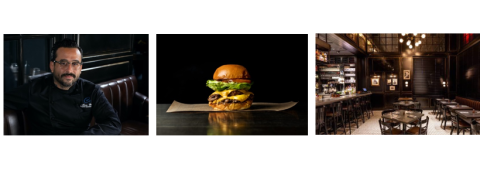Heritage and Prohibition Era Drinks are a Leading Beverage Trend Today
The prolonged economic recession has spawned a unique longing for times past and this has begun to manifest within the hospitality industry. As such, I continue to see “heritage” as an evolving movement in food and beverage. Different than “comfort food,” “heritage” harkens to a specific time period in the past (or sometimes in the future). From a food perspective, this might be the “Paris 1906” menu offered at Grant Achatz’s Next restaurant in Chicago when it opened last year, or on the beverage side, the return to the Mad Men era of classic drinks or prohibition period cocktails. Are patrons longing for a place to escape, pretend, or just forget about “today?” Or, is the movement rooted in the aspiration for a higher quality experience that has some level of transparency to validate its authenticity. The perception that “they just don’t make them like they used to” is a romanced historical revision, but it has strong consumer appeal. If you’re not convinced consumers are gravitating towards products that reflect evidence of superiority, view holistically these emerging or established categories, craft beer, heirloom tomatoes (and now other vegetables), heritage beef (from specific breeds of cattle such as Hereford, Devon, etc.) artisanal cheese, and of course organic. Combine an elevated level of quality into a broader guest experience and you can deliver on a consumer’s ultimate pipe dream.
This may be a great theory, but is it really being executed? Yes, both independently and for the masses, on land and (in my case), at sea. For example, The Standard Pour in Dallas uses homemade bitters, infusions, compounds and downright pure experimentation to create a back bar something just short of a Harry Potter movie set. The beverage menu is an immersive prohibition experience in look, feel and listings and sparks a level of interest sorely missing from most modern drink menus of today. During a recent visit, I was compelled to order several cocktails, simply because I was intrigued by the discovery of world-class ingredients (including even the secondary and tertiary ingredients). Who chooses a cocktail because it has Carpano Anitica Formula vermouth or Luxardo Maraschino cherries? I did. My experience at The Standard Pour was a powerful example of a world where quality is becoming the deciding factor to an increasingly educated and aspirational consumer (thank you Food Network). When you see ingredients that are the best in their category, all the way down to vermouths, bitters and cherries, you know they reflect not just attention to detail, but effort and a truly uncommon level of commitment. I simply had to partake because I knew I would not find a similar experience on the next stop of my little drink safari.
At Royal Caribbean International, we have begun to move our world-wide operations in this direction, embracing the evolution as we see it advance in several ways. With 22 ships, on six continents, and nearly 40,000 “hotel” rooms at sea, executing to scale certainly comes with challenges. One example of our beverage evolution is a prohibition-era speakeasy event held on the 2,400 room passenger ship, Allure of the Seas. Known publicly as the innocent-sounding “High Spirits Jazz Society,” the event began as a “secret,” by invitation only, all inclusive cocktail party with live jazz, dancing and entertainment. Originally, this event was held just once per seven day voyage in the Jazz on 4 bar. Our suite guests were invited using a purpose made matchbook that holds a pin that they wore to gain entrance. It has now progressed to an open event that can be booked online prior to sailing by any guest (patrons still receive the matchbook with the pin placed in their room), many of whom now show up in costume. The other key to its success is a close partnership with Royal Caribbean’s Entertainment team whose team members, along with the bar staff, bring to life the roaring 20’s during the event. Of course having the Broadway hit “Chicago” performed in our theater three times a week also helps to promote the right mindset with guests.
Throughout the two hour event, guests can sample various prohibtion-era cocktails such as the White Lady, a drink that is a tribute to Mata Hari, the Temperance Tea, or the Mary Pickford, a cocktail honoring one of the founders of the Academy of Motion Picture Arts and Sciences. All drinks are served in prohibition-era unique glassware, such as coquetier cups and tea cups. A “raid” by the police towards the end of the event and the nearly simulatenous announcement that prohibition has been repealed and the bar is now open to celebrate, facilitate the end of the all inclusive event. The bar staff welcomes guests to linger well into the morning to a bar that now charges.
With the economic melt-down still ripe in Europe, and to a lesser degree in the United States, I believe “heritage” will continue to be embraced for some time. The truth is that we all would like to experience a romanced version of times past and perhaps this is the food and beverage equivalent of the movie, Midnight in Paris. As the education and aspiration of consumers continues to evolve, beverage (and food) will have to “up their game” to stay relevant and appreciated.
A great indicator that the demand for excellence in beverage operations will continue to grow rapidly is the recent addition of an award for Best Bar Program, to what is generally considered the Oscars of food, The James Beard Award. The appreciation and recognition of excellence in beverage operations is upon us and the current trends of classic drinks, higher quality ingredients and attention to detail all points to a time in the past that seems immeasurably better than today. Perhaps the next trend in beverage will be future based but for now, I’m thoroughly enjoying a rendezvous with the past.
Bob Midyette is the director of Fleet Beverage Operations for Royal Caribbean International and Azamara Club Cruises. He holds an MBA and a BS in Hospitality Management from Florida International University as well as an AOS in Culinary Arts from Johnson & Wales University. Midyette has led the expansion of operations into markets such as Asia, South America, Australia, Europe, and the Middle East. His full profile is available on LinkedIn. Royal Caribbean International is a global cruise brand with 22 innovative ships, 40,000 rooms, and visits to more than 270 destinations in 72 countries across six continents.






